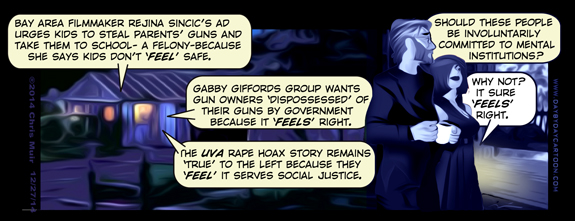The Second Amendment Foundation has filed suit in Federal court against portions of Washington State's Initiative 594. The suit charges that the new law infringes on the Second and Fourteenth Amendments of the US Constitution as well as on portions of the Washington State Constitution.
They also allege that the new law is so vague that, "a person of ordinary intelligence cannot understand its scope, which renders it subject to arbitrary enforcement." They go on to add, "The agencies of the State of Washington have so far either disclaimed the responsibility to interpret I-594 or provided interpretations that are so far removed from the language as to be useless."
The business plaintiffs include the Northwest School of Safety, Puget Sound Security, Inc., Pacific Northwest Association of Investors, and the Firearms Academy of Seattle. The individual plaintiffs include SAF's Alan Gottlieb, CalGun's Gene Hoffman, the Gottlieb Revocable Family Living Trust, Andrew Gottlieb, Daryl Lee, CCRKBA's legislative director Joe Waldron, and Xee Del Real. SAF is also a party to the suit.
The suit names Washington State Attorney General Bob Ferguson, the Attorney General's Office, and the head of the Washington State Patrol as the defendants. The suit seeks a preliminary and permanent injunction against the enforcement of I-594's amendments to RCW 9.41 as it relates to:
non-commercial transfers of firearms to private citizens who are otherwise qualified to possess firearms, or otherwise enforcing any policies, rules, or procedures prohibiting or otherwise restricting the non-commercial transfer of firearms to private citizens who are otherwise qualified to possess firearms.The suit entitled Northwest School of Security el al v Ferguson et al is being brought in US District Court for the Western District of Washington. A copy of the complaint can be found here.
The release from SAF is below:
BELLEVUE, WA – The Second Amendment Foundation today filed a lawsuit in federal district court in Tacoma, seeking a permanent injunction against enforcement of portions of Initiative 594, the 18-page gun control measure that took effect Dec. 4, alleging that “portions of I-594…are so vague that a person of ordinary intelligence cannot understand their scope,” and that other parts violate the Second Amendment outright.
Joining SAF in this action are the Northwest School of Safety, Puget Sound Security, Inc., the Pacific Northwest Association of Investors, the Firearms Academy of Seattle, six individual citizens including SAF founder and Executive Vice President Alan Gottlieb and the Gottlieb Family Trust. They are represented by Seattle attorneys Steven Fogg and David Edwards, and Bellevue attorney Miko Tempski.
Named as defendants are Attorney General Bob Ferguson and Washington State Patrol Chief John Batiste, in their official capacities.
“We took this action due to the confusing and arbitrary language and nature of I-594,” Gottlieb explained. “Three of our plaintiffs, including my son, are residents of other states and cannot legally borrow handguns for personal protection while traveling in Washington. Under I-594, all transfers must be done through federally-licensed firearms dealers, but under federal law, dealers cannot legally transfer handguns to residents of other states. I-594 also essentially prohibits our non-resident plaintiffs from storing their own firearms here.
“This measure effectively infringes upon, if not outright prohibits, the exercise of their constitutionally-protected right to bear arms under the Second Amendment,” he added.
Gottlieb pointed to a recent directive from the state Department of Fish and Wildlife to its volunteer hunter education instructors regarding firearms transfers in class that amount to “straw-man transfers.” The lawsuit also notes that the State Patrol said it could not prove that a change of possession not covered by an I-594 exemption was a “transfer,” making enforcement of the new law “difficult if not impossible.”
“We’re not trying to stop background checks,” Gottlieb said. “We’re taking action against a poorly-written and unconstitutionally vague measure that criminalizes activities that are perfectly legal anywhere else in the country, thus striking at the very heart of a constitutionally-protected, fundamental civil right.”




















